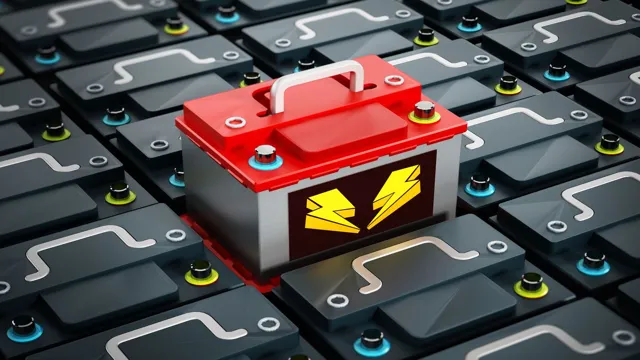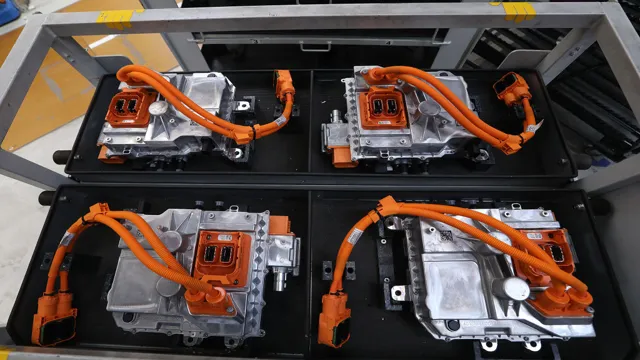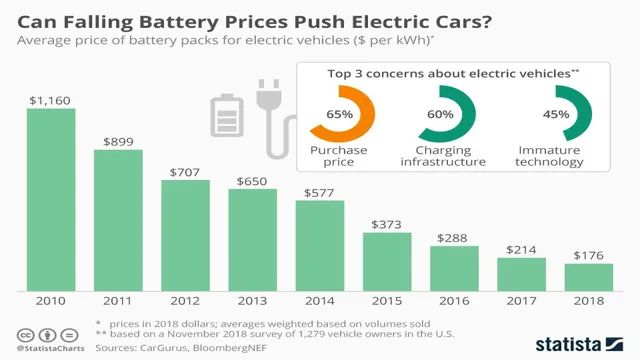Lithium-ion Batteries: The Powerhouse Behind Electric Cars
Electric cars have revolutionized the automotive industry with their emissions-free performance and energy efficiency. However, many people wonder what type of battery powers these electric vehicles. Are electric car batteries lithium-based? The answer is yes.
Lithium-ion batteries are the most common type of battery used in electric cars due to their high energy density, fast charging capabilities, and longer lifespan. In this blog post, we will delve into what makes lithium-ion batteries so special and why they are the preferred choice for electric car manufacturers. So, buckle up and get ready to learn about the power behind the electric car revolution.
Understanding Lithium-ion Batteries
Yes, electric car batteries are commonly made using lithium-ion technology. Lithium-ion batteries are rechargeable and highly efficient, making them an ideal choice for electric cars and other modern devices that require a reliable power source. These batteries work by transporting lithium ions between two electrodes, which are typically made of graphite and a lithium metal oxide.
When the battery is charged, the ions move from the positive electrode to the negative electrode. When the battery is discharged, the process is reversed and the ions move from the negative electrode to the positive electrode, producing electrical energy. As technology continues to advance, lithium-ion batteries are becoming increasingly popular for use in everything from smartphones to electric cars, offering a long lifespan and a sustainable source of energy for a greener future.
What Makes Lithium-ion Batteries Ideal for Electric Cars?
Lithium-ion batteries are considered ideal for electric cars due to their efficient performance, lightweight and compact size. These batteries consist of a cathode, an anode, and an electrolyte that store energy for use by the car’s electric motor. Unlike traditional lead-acid batteries, lithium-ion batteries can discharge and recharge more rapidly and efficiently.
This means that the electric car can accelerate quickly and run for longer distances on a single charge. Additionally, lithium-ion batteries have a longer lifespan and require less maintenance than other types of batteries, making them an ideal choice for electric car manufacturers. The use of lithium-ion batteries also reduces the carbon footprint of electric vehicles as they are more eco-friendly than traditional combustion engines.
Overall, the use of lithium-ion batteries in electric cars is an essential element in promoting sustainable transportation.

How Do Lithium-ion Batteries Work?
Lithium-ion batteries are found in many of our everyday devices, including cell phones, laptops, and even electric cars. These batteries work by storing electrical energy in tiny cells known as electrodes. The electrodes are made from materials that can store lithium ions, which are positively charged particles.
When the battery is being used, the lithium ions move from one electrode to the other, creating a flow of electrical energy. This flow of energy can power our devices for hours, depending on the size and capacity of the battery. When the battery is depleted, it can be recharged by sending the lithium ions back to their original electrode using an electrical current.
This is why lithium-ion batteries are so popular – they are rechargeable, lightweight, and have a high energy density, which means they can store a lot of energy in a small space. Understanding how lithium-ion batteries work is important because it can help us make informed decisions when choosing which devices to buy and how to properly care for them to extend their lifespan.
Types of Electric Car Batteries
Yes, electric cars utilize lithium-ion batteries. While there are a variety of different battery types used in electric vehicles, lithium-ion batteries are the most common due to their high energy density, long lifespan, and low self-discharge rates. Other types of batteries used include nickel-metal hydride and lead-acid.
However, as lithium-ion technology continues to improve and become more affordable, it is anticipated that it will become the go-to choice for electric vehicle manufacturers. Lithium-ion batteries are capable of storing larger amounts of energy in a smaller space, making them ideal for use in vehicles that require a high amount of power. Additionally, they are more environmentally friendly and recyclable compared to lead-acid batteries.
So, to sum up, electric cars batteries do use lithium, and this trend is expected to continue as it is a preferred choice for its efficient energy storage capabilities.
Lithium-ion Batteries Compared to Other Battery Types
When it comes to electric car batteries, there are a few different types to choose from, each with its own set of advantages and drawbacks. The most common type is the lithium-ion battery, which is known for its high energy density and long lifespan. However, there are also other battery types such as lead-acid, nickel-metal hydride, and solid-state batteries.
Lead-acid batteries have been around for a long time and are often used in traditional cars, but they are heavy and have a low energy density, which makes them less than ideal for electric cars. Nickel-metal hydride batteries are a step up from lead-acid, with a higher energy density and longer lifespan, but they still can’t compete with lithium-ion batteries in terms of performance. Solid-state batteries, on the other hand, are a relatively new type of battery that uses a solid electrolyte instead of a liquid one, which makes them safer and more efficient, but they are still in the research and development phase and not yet commercially available.
Overall, while there are different types of electric car batteries to choose from, lithium-ion batteries remain the most popular and practical choice for the foreseeable future.
Advantages and Disadvantages of Lithium-ion Batteries for Electric Cars
When it comes to electric cars, the battery is one of the most important components, providing the vehicle with power to run on. There are several types of electric car batteries available, but the most commonly used is the lithium-ion battery. These batteries are popular due to their high energy density, providing more power in a smaller, lighter package.
Additionally, they have a longer lifespan than other battery types and are less prone to developing a memory effect, where the battery no longer holds a full charge. However, there are also some disadvantages to lithium-ion batteries, including their high cost and the risk of thermal runaway, where the battery can catch on fire or explode. Despite these drawbacks, lithium-ion batteries remain the most popular choice for electric cars due to their high performance and efficiency.
Recent Developments in Lithium-ion Battery Technology
When it comes to electric cars, one of the most important components is the battery. Electric cars rely on lithium-ion batteries to power their engines and provide them with the range they need to get from point A to point B. There are several types of lithium-ion batteries currently being used in electric cars, each with its own strengths and weaknesses.
The most popular type of battery is the NCM battery, which stands for nickel-cobalt-manganese. NCM batteries are known for their high energy density, which means they can store a lot of energy in a small space. Another type of battery is the LFP battery, which stands for lithium iron phosphate.
LFP batteries are known for their safety and long life span, but they have a lower energy density than NCM batteries. Finally, there are also the solid-state batteries, which are still in development. Solid-state batteries have the potential to provide even higher energy density than NCM batteries, but they are still in the early stages of production.
Regardless of the type of battery, advancements in lithium-ion battery technology are constantly being made to improve their performance, efficiency, and affordability.
Future of Electric Car Batteries
Yes, most electric car batteries use lithium-ion technology. But what does the future hold for these batteries? As electric cars become more prevalent, the race is on to create more efficient and longer-lasting batteries. The good news is that innovation in this area is moving at an impressive pace.
One promising area of research is in the development of solid-state batteries. These could hold more energy than lithium-ion batteries and also be safer, since they are less prone to overheating. Another area of interest is the use of lithium-sulfur batteries.
These batteries could be cheaper and more environmentally friendly since they use sulfur instead of cobalt, which is often mined in conflict zones. Whatever the future holds, it’s clear that there are exciting times ahead for electric car batteries.
Innovations in Lithium-ion Battery Technology
Lithium-ion battery technology has come a long way in recent years, and the future of electric car batteries is looking bright. One of the most significant innovations in lithium-ion battery technology is the development of solid-state batteries. These batteries use a solid electrolyte instead of a liquid one, which makes them much safer and more durable.
They also have higher energy density, which means they can store more power in less space. Another promising development is the use of silicon anodes instead of graphite ones. Silicon can store more lithium ions, which means it can hold more energy, but it has been difficult to use in the past because it expands and contracts as it absorbs and releases lithium ions.
However, researchers are working on ways to make silicon anodes more stable and practical for use in electric car batteries. With these and other innovations in the works, the future of electric car batteries is looking increasingly bright, and we can expect to see more efficient and longer-lasting batteries in the near future.
Emerging Battery Technologies for Electric Cars
Electric Car Batteries Electric cars are revolutionizing the way we think about transportation. However, one of the main challenges for electric cars has been their limited driving range and the time needed to recharge the batteries. This has led to the development of emerging battery technologies that promise to revolutionize the future of electric cars.
For example, solid-state batteries are being developed that use a solid electrolyte instead of a liquid one. This technology has the potential to double the energy density of batteries while being safer and more durable. Moreover, flow batteries are being developed that can be recharged in the same amount of time as it takes to refuel a traditional car.
Additionally, lithium-sulfur batteries are being developed that have the potential to achieve five times the energy density of current lithium-ion batteries. As these emerging battery technologies continue to improve, we can expect electric cars to become more practical and widely adopted, ultimately contributing to a more sustainable future.
Conclusion
In conclusion, it’s no secret that electric cars are powered by batteries. But what makes these batteries so special? Well, it turns out that many electric cars rely on lithium-ion batteries, which pack a powerful punch in a small package. With their ability to store large amounts of energy in a relatively small space, these batteries have become a key ingredient in the transition to cleaner, greener transportation.
So, the next time you see an electric car whizzing by, remember that behind that sleek exterior lies a powerful lithium-ion battery, helping to pave the way towards a more sustainable future.”
FAQs
How are lithium batteries used in electric cars?
Lithium batteries are commonly used in electric cars to power the vehicle. These batteries are preferred as they are lightweight and have a high energy density, making them more efficient and powerful.
What are the benefits of using lithium batteries in electric cars?
Lithium batteries have several benefits when used in electric cars. These include longer driving range, faster charging times, and a more lightweight and compact battery system.
Are all electric cars powered by lithium batteries?
No, not all electric cars are powered by lithium batteries. While lithium is the most common type of battery used in electric cars, there are other types such as nickel-metal hydride (NiMH) and lead-acid batteries that can also be used.
How long do lithium batteries typically last in electric cars?
Lithium batteries used in electric cars are generally designed to last for several thousand charging cycles, which translates to several years of use. However, the lifespan can vary depending on factors such as usage patterns, maintenance, and climate.




